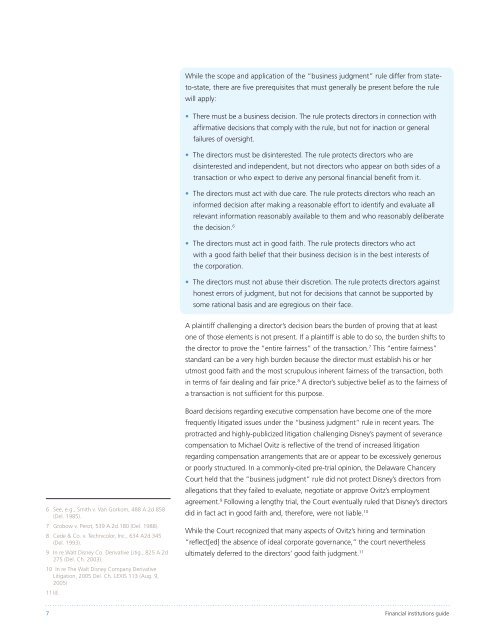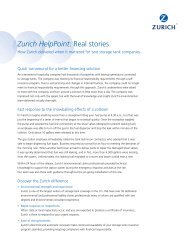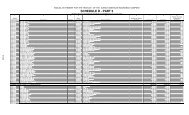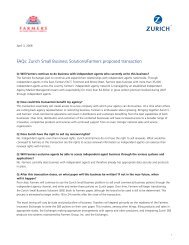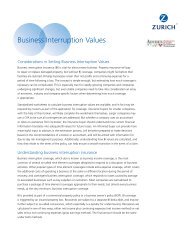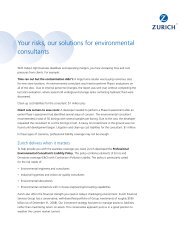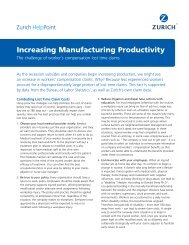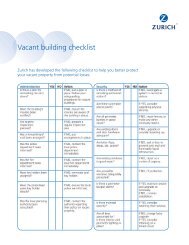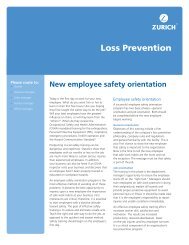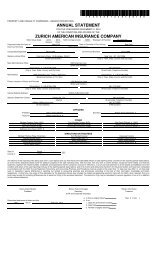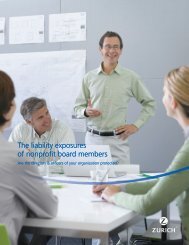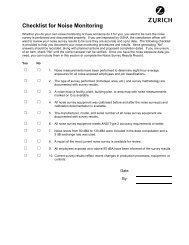Know the risks - Zurich
Know the risks - Zurich
Know the risks - Zurich
Create successful ePaper yourself
Turn your PDF publications into a flip-book with our unique Google optimized e-Paper software.
While <strong>the</strong> scope and application of <strong>the</strong> “business judgment” rule differ from stateto-state,<strong>the</strong>re are five prerequisites that must generally be present before <strong>the</strong> rulewill apply:• There must be a business decision. The rule protects directors in connection withaffirmative decisions that comply with <strong>the</strong> rule, but not for inaction or generalfailures of oversight.• The directors must be disinterested. The rule protects directors who aredisinterested and independent, but not directors who appear on both sides of atransaction or who expect to derive any personal financial benefit from it.• The directors must act with due care. The rule protects directors who reach aninformed decision after making a reasonable effort to identify and evaluate allrelevant information reasonably available to <strong>the</strong>m and who reasonably deliberate<strong>the</strong> decision. 6• The directors must act in good faith. The rule protects directors who actwith a good faith belief that <strong>the</strong>ir business decision is in <strong>the</strong> best interests of<strong>the</strong> corporation.• The directors must not abuse <strong>the</strong>ir discretion. The rule protects directors againsthonest errors of judgment, but not for decisions that cannot be supported bysome rational basis and are egregious on <strong>the</strong>ir face.A plaintiff challenging a director’s decision bears <strong>the</strong> burden of proving that at leastone of those elements is not present. If a plaintiff is able to do so, <strong>the</strong> burden shifts to<strong>the</strong> director to prove <strong>the</strong> “entire fairness” of <strong>the</strong> transaction. 7 This “entire fairness”standard can be a very high burden because <strong>the</strong> director must establish his or herutmost good faith and <strong>the</strong> most scrupulous inherent fairness of <strong>the</strong> transaction, bothin terms of fair dealing and fair price. 8 A director’s subjective belief as to <strong>the</strong> fairness ofa transaction is not sufficient for this purpose.6 See, e.g., Smith v. Van Gorkom, 488 A.2d 858(Del. 1985).7 Grobow v. Perot, 539 A.2d 180 (Del. 1988).8 Cede & Co. v. Technicolor, Inc., 634 A2d 345(Del. 1993).9 In re Walt Disney Co. Derivative Litig., 825 A.2d275 (Del. Ch. 2003).10 In re The Walt Disney Company DerivativeLitigation, 2005 Del. Ch. LEXIS 113 (Aug. 9,2005)11 Id.Board decisions regarding executive compensation have become one of <strong>the</strong> morefrequently litigated issues under <strong>the</strong> “business judgment” rule in recent years. Theprotracted and highly-publicized litigation challenging Disney’s payment of severancecompensation to Michael Ovitz is reflective of <strong>the</strong> trend of increased litigationregarding compensation arrangements that are or appear to be excessively generousor poorly structured. In a commonly-cited pre-trial opinion, <strong>the</strong> Delaware ChanceryCourt held that <strong>the</strong> “business judgment” rule did not protect Disney’s directors fromallegations that <strong>the</strong>y failed to evaluate, negotiate or approve Ovitz’s employmentagreement. 9 Following a lengthy trial, <strong>the</strong> Court eventually ruled that Disney’s directorsdid in fact act in good faith and, <strong>the</strong>refore, were not liable. 10While <strong>the</strong> Court recognized that many aspects of Ovitz’s hiring and termination“reflect[ed] <strong>the</strong> absence of ideal corporate governance,” <strong>the</strong> court never<strong>the</strong>lessultimately deferred to <strong>the</strong> directors’ good faith judgment. 117Financial institutions guide


